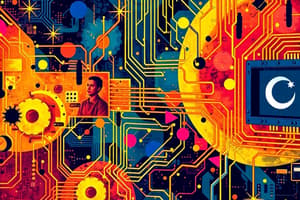Podcast
Questions and Answers
What is the ethical issue highlighted in the text regarding software?
What is the ethical issue highlighted in the text regarding software?
- Spreading false propaganda about historical events
- Copying somebody else’s program without authorization
- Using proprietary software without payment (correct)
- Bypassing authorization systems
What is the purpose of embedding information about the copyright owner into digital pictures?
What is the purpose of embedding information about the copyright owner into digital pictures?
- To identify the creator of the pictures (correct)
- To enhance the quality of the pictures
- To protect the pictures from being copied
- To make the pictures available for free use
What does the text warn against regarding computer resources?
What does the text warn against regarding computer resources?
- Encrypting personal information
- Sharing computer resources with others
- Trying to bypass authorization systems (correct)
- Using multiuser systems
What type of action is considered unethical in the context of intellectual property in the text?
What type of action is considered unethical in the context of intellectual property in the text?
What social aspect should be considered when developing programs or designing systems?
What social aspect should be considered when developing programs or designing systems?
What is the underlying principle related to human interaction when using computers according to the text?
What is the underlying principle related to human interaction when using computers according to the text?
What is the equivalent of writing a program that handles the timing of a bomb, according to the text?
What is the equivalent of writing a program that handles the timing of a bomb, according to the text?
Why is reading other people's e-mail messages considered unethical?
Why is reading other people's e-mail messages considered unethical?
What can spread untruth as fast as it can spread truth, according to the text?
What can spread untruth as fast as it can spread truth, according to the text?
Which action is compared to obtaining other people's non-public files in terms of ethical judgment?
Which action is compared to obtaining other people's non-public files in terms of ethical judgment?
What does using a computer to break into the accounts of a company or a bank and transferring money equate to?
What does using a computer to break into the accounts of a company or a bank and transferring money equate to?
Why is generating and consciously spreading computer viruses considered unethical?
Why is generating and consciously spreading computer viruses considered unethical?
Flashcards are hidden until you start studying
Study Notes
Computer Ethics
- Spreading false rumors or propaganda about a person or historical events is unethical.
Intellectual Property
- Software is an intellectual product, and obtaining illegal copies of copyrighted software is illegal and unethical.
- Copyright information can be embedded into digital pictures using watermarking.
Computer Resources
- Using other people's computer resources without authorization or proper compensation is unethical.
- Hacking a system to bypass authorization is illegal and unethical.
Intellectual Output
- Copying someone else's program without authorization is software piracy and is unethical.
- Intellectual property is a form of ownership and may be protected by copyright laws.
Social Consequences
- Programmers must consider the social consequences of their programs, including potential harm to society.
- Programmers are responsible for the content of their programs, especially when it comes to children.
Respect for Humans
- Computer users must always use computers in ways that ensure consideration and respect for fellow humans.
- Computers should not be used to harm or manipulate others.
Harm to Others
- Using a computer to harm others is unethical, including writing programs that cause harm.
- Accessing and destroying others' files is equally bad as stealing and destroying their physical property.
Interference with Computer Work
- Generating and spreading computer viruses is unethical, as they disrupt others' computer work.
- Computer viruses can destroy files, take up computer time and memory, or display annoying messages.
Privacy
- Reading others' e-mail messages or accessing their non-public files is an invasion of privacy and is unethical.
- Obtaining others' non-public files is equivalent to breaking into their rooms and stealing their documents.
Stealing
- Using a computer to steal, including breaking into accounts and transferring money, is illegal and unethical.
- Computer theft is equivalent to robbery and has strict laws against it.
False Information
- Using a computer to spread false information or "bear false witness" is unethical and can spread quickly online.
- It is important to ensure the accuracy of information before sharing it online.
Studying That Suits You
Use AI to generate personalized quizzes and flashcards to suit your learning preferences.




